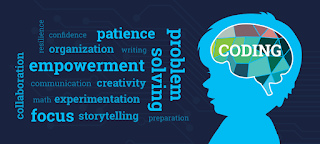CODING IN TODAY’S WORLD
“Code never lies; comments sometimes do.“- Ron Jeffries.
The possibility for code and comments to contradict each other has opened a heated debate about whether comments do more harm than good. Code is the language of the modern world whether it’s the app that brings emails to a mobile or the car that knows how many miles to go until refueling. Any smart device needs code instructions to tell it how to operate and communicate with the outside world. Almost all experts agree that coding will become nearly as ubiquitous as literacy in the future. Coding is becoming the new literacy; a skill so fundamental that everyone should do it to some degree. We use it to program the websites, apps, and other technologies we interact with every day.

IMPORTANCE OF CODING LANGUAGES
Coding is a basic literacy in the digital age, and it is important for kids to be able to work with and understand the technology around them. Having children learn coding at a young age prepares them for the future. Coding helps children with communication, creativity, math, writing, and confidence. Coding skills will provide you with a high level of tech literacy which will allow open up new opportunities in your career or organization. Coding helps in developing the idea, which leads to the creative and analytical thinking process. It helps in preparing the kids to become future entrepreneurs. At an early age kids’ minds can adapt to anything, and can learn anything. It is the best time to introduce coding to them, because of their grabbing and learning power. By introducing coding at an early age, they can focus and learn it the same as they learn other foundational subjects and be future-ready. It brings innovations to personal and professional life and the ability to give jobs. Medical coding takes the descriptions of diseases, and injuries and transforms them into numeric or alphanumeric codes to accurately describe the diagnosis and the procedures performed. Medical coding is needed in nearly every healthcare setting large hospitals, government hospitals, physician groups, nursing homes, rehabilitation centers, law firms, insurance companies, and more. The programming industry is definitely not the only one where coding skills are in demand however other industries including commerce, finance, design and market scientists, engineers, data analysts, artists, designers, and researchers would all have their work cut short when armed with coding skills. Moreover, India is turning into a digital and start-up hub, and coding skills are just starting the in-demand climb. The National Education Policy (NEP) introduced coding at a young age to enhance exposure to technology and create a path to a new world of innovation and creativity. Integration of technology in the education process was boosted in India during the COVID-19 pandemic. This has also created a unique opportunity for the Ed-tech start-up like Whitehat jr, Toppr, Vedantu, Coding Chief, etc which have already started preparing their students to observe, analyze and hence become better problem solvers by inculcating the habit of coding in primitive minds in fun learning environments.

LIMITATIONS AND FUTURE OF CODING
One of the biggest disadvantages of being a computer programmer is the associated health risks such as eye strain, muscle pain, and repetitive strain. Many people do not have access to the required devices and internet connection, especially in villages. Many times online classes are interrupted due to technical glitches due to poor internet connection. So, the competition in this field is global and you have to be very perfect to cope with this. Most software developers have to sacrifice their personal and social life to make the deliveries on time.
New innovation updates, processes, and ways of doing things appear at every movement. The new technology of today quickly becomes old news. Coding has to move quickly to keep itself up to date with the solutions it is required to find in the near future. However, it looks like software engineers won’t be running out of jobs. The code may change, languages may change and the challenges may change. Computer programming will become a core part of education along with Math, Science, and languages. Every professional career of the future will require proficiency in coding as well as data analysis, machine learning, and other kinds of tech. According to the Bureau of Labour Statistics between 2016 and 2026, the number of software engineers is expected to grow at a rate of 24% much faster than any other occupation in the country.
CONCLUSION
Coding is one of the important skills for future jobs. It is beneficial for every sector. The Indian government is also doing efforts to promote it in education as well as other sectors. At last, we can say that coding might be on the verge of shifting from luxury to necessity in the near future.

